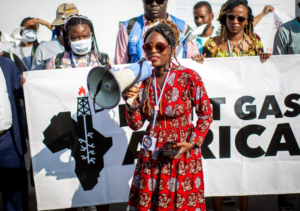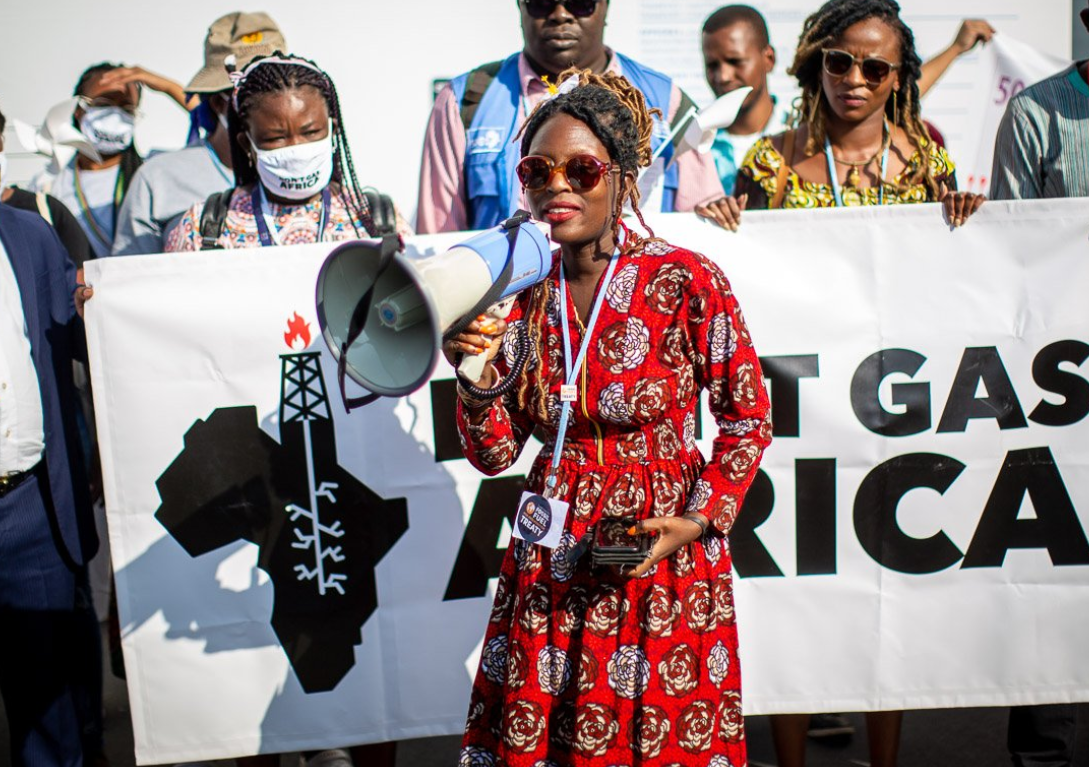
We are into the second week at the COP27 climate talks in Egypt. The disconnect is evident everywhere you look at the conference.
On the one hand, at every civil society or scientific panel, the talk is of the need to phase out fossil fuels, and yet at the moment fossil fuels are not mentioned in the final decision text for the COP.
First draft of final decision text for #COP27 released last night. On equitable energy transition:
??ref to the need to accelerate energy transition
??ref to the need to escalate investments in efficiency & renewables
?nothing on what we’re transitioning from – coal, oil & gas— Catherine Abreu – same handle everywhere! (@catabreu_) November 15, 2022
The disconnect continues. Civil society activists have spent today, officially Energy Day at COP, highlighting the risk of massive gas expansion across Africa, using the slogan #DontGasAfrica.
But on the other hand, the COP is literally crawling with fossil fuel lobbyists who want to do just that. There are over 100 more fossil fuel lobbyists at the conference than at last year’s summit in Glasgow. The boss of BP even sneaked in as a delegate for Mauritania, along with four other employees.
Leading climate scientists say that if we want a livable future and stick to 1.5 degrees warming, we cannot carry on exploiting and producing more oil and gas. However, the fossil industry is actively wanting to exploit Africa’s gas reserves and increase gas production significantly.
No wonder BP wanted to be at the conference. The company is one of the biggest investors in Africa, along with Total, Shell, Eni, and Chevron, according to a new report by Urgewald, Friends of the Earth France, Reclaim Finance and 36 African organizations, released today.
The biggest investor of all is Blackrock, closely followed by other commercial banks and funds, which have channelled a staggering USD 100 billion to companies developing new fossil projects in Africa over the last three years.
This level of investment in Africa into fossil fuels cannot continue if we want to stick to 1.5 degrees of warming. It cannot continue if we want livable and sustainable African communities.
At a series of events today, speaker after speaker warned against this Dash for Gas. Outside the conference hall, delegates today shouted “Don’t Gas Africa! Don’t Gas Africa!,” as speakers warned what this dash could do to the continent.
Don’t gas Africa. “Fossil fuel is not development for us.” #DontGasAfrica #KeepItInTheGround #COP27 @CANIntl @gcdcj pic.twitter.com/zLce1TTvZX
— Ben Goloff (@benjamingoloff) November 15, 2022
One of those speaking was Ina-MariaShikongo, (main picture) a frontline defender from the Okovango Delta in Southern Africa, who said: “We say no to this neo-colonialism. When polluters come to our continent, whatever happens here will not stay here: we only have one carbon budget.”
Others tweeted about the event too:
Strong message from Lorraine Chiponda as #EnergyDay at #COP27 kicks off. African youth saying loud and clear #DontGasAfrica. pic.twitter.com/OGbAckujax
— South Africa Climate News (@ZAClimateNews) November 15, 2022
“Fossil fuels is not development for us. We have already lost so many. This will only threaten our health our lands and our children. Our future is dying. We are losing our homes, our water our lives. Don’t gas Africa” protest today #COP27 pic.twitter.com/jw5jwNruJ9
— Tzeporah Berman (@Tzeporah) November 15, 2022
In a series of tweets, Mohamed Adow, director of the energy and climate think tank, PowerShiftAfrica stated: “Africa sits at a crossroads & there is a fight to decide its energy & development future playing out at #COP27. A cabal of fossil fuel companies supported by foreign nations are trying to push Africa into a fossil fuel led development future. We say to them Don’t Gas Africa.”
He continued that any dash for African gas “would clearly be a disaster for the planet, but also for Africans, who make up some of the most acutely impacted victims of climate change, & also straddle Africa with a fossil fuel industry that will be obsolete in a few years”.
“These people have co-opted the narrative of neo-colonialism, claiming that their dirty energy product will be a boon for Africa, when in actual fact they are selfishly seeking their own profits,” tweeted Adow.
Meanwhile, at an OilWatch event on ending Colonial extraction, Noble Wadzah of Oilwatch Ghana warned that “The new colonialism is corporations” who are threatening the continent with further oil and gas extraction.
My colleague, Thuli Makama also added: “We need to mobilize people power to overturn this narrative of extractivism.”
Today, @thulimakama @PriceofOil introduced the @oilwatchafrica1 press conference on Ending Colonial Extraction at #COP27 in Sharm El-Sheikh
A thread of quotes and images from the brilliant panel below ?? pic.twitter.com/yBqlcKefjF
— Oil Change International (@PriceofOil) November 15, 2022
And that is what we need. People from across the continent standing up to the fossil fuel companies, saying we don’t need any more pollution, extraction, corruption and colonialism. We don’t need more Niger Deltas in Africa. We need clean sustainable energy, of which Africa could be a homegrown powerhouse.

